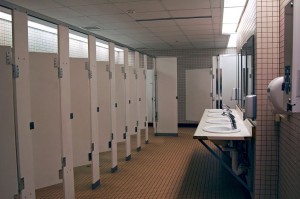More Bathroom Bills Arise after South Dakota Defeat

This past February we covered a proposed bill in South Dakota that would’ve prevented transgender students from using bathrooms and locker rooms that correspond with their gender identities. Though fortunately that bill was vetoed shortly after we posted the article, similarly atrocious bills have since popped up throughout the United States.
Last week North Carolina Governor Pat McCrory signed a bill drafted during a hasty “special session” that requires all residents to use bathrooms designated for their biological sex as “stated on a person’s birth certificate.” In response, several corporations—including Apple, the NFL, IBM, American Airlines, and the NBA— have threatened to boycott the state of North Carolina. Just this past weekend Washington, DC, Mayor Muriel Bowser banned city employees from traveling to North Carolina on official business. Even the state’s attorney general, Roy Cooper, recently stated he would not defend the new law in court, calling it “unconstitutional” and “a national embarrassment.” Cooper, a Democrat who’s currently running against McCrory, said that not only does the law discriminate against LGBT people, but it will also “set North Carolina’s economy back if we don’t repeal it.”
Gov. McCrory, however, maintains that the law doesn’t discriminate against anyone and that the public outcry is nothing more than “political theater.” In a recent appearance on NBC News he asked, “Would you want a man to walk into your daughter’s shower and legally be able to do that because mentally they think they are of the other gender?”
Responding to the new law, a transgender man from Charlotte, North Carolina, named Charlie Comero has started passing out cards to cis women in public women’s rooms that read, “I’m following the law that was passed on March 23. I am a transgender man who would rather be using the men’s room right now. This is likely uncomfortable for both of us. Please contact your legislature and tell them you oppose HB-2.”
“Some transgender people are more at risk for violence/harassment because of this law than others due to how they are seen in public,” Comero recently wrote on his Facebook page. “My choice to do this has everything to do with acknowledging my white and (sometimes) male cis-passing privilege. I am not always seen as male. When I started feeling male privilege during my transition, I vowed to myself that I would use that privilege to bring awareness to things that might not be popular to say; anything else would be a betrayal of myself and my equity/feminist values.”
Meanwhile, Kansas legislators have proposed the “Student Physical Privacy Act,” that would give students the right to sue schools if transgender students are caught using school bathrooms that match their gender identities. The two bills that make up the act claim, “Allowing students to use restrooms, locker rooms, and showers that are reserved for students of a different sex will create potential embarrassment, shame, and psychological injury to students.” The bills state that special accommodations can be made for transgender students, but as Tom Witt of Equality Kansas explains, “This is isolating kids, and it’s not going to end well. It’s putting a target on their backs.” Fortunately, the bills have met little support. Republican Kansas Rep. Stephanie Clayton, for example, says that “such a bill introduced so late in the session is meant to distract the public from the matters at hand for the legislature.”
Luckily, proposed bathroom bills don’t always pass. The Virginia House of Delegates killed a transphobic bathroom bill back in February. More recently, Georgia Governor Nathan Deal vetoed a bill that would allow for discrimination against LGBT people in the name of “religious freedom,” citing that “he knew of no instances in which the conflicts that the bill seeks to prevent had actually taken place.”
Businesses are starting to adopt new bathroom policies to accommodate transgender people as well. A Kroger grocery store in Atlanta, Georgia, for example, recently made headlines after installing a unisex public bathroom policy. According to a sign outside the unisex bathroom door, the purpose of having a unisex bathroom is to make things more comfortable for fathers with little girls, mothers with little boys, people with disabilities, and “those in the LGBTQ community.” A customer posted a picture of the sign onto her Facebook page and wrote, “Nice job, Kroger.”
Whether North Carolina will ultimately follow Virginia and Georgia is hard to say. However, as Comero reminds his Facebook followers, “If we fight with love and compassion, people will listen.”
